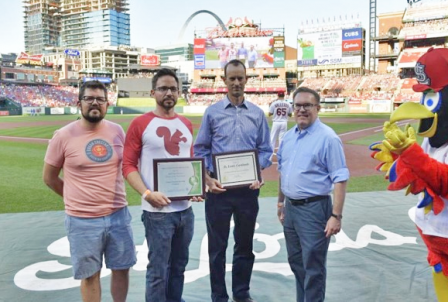News Releases from Region 07
St. Louis Cardinals Earn Regional Award for Making Significant Progress in Reducing Food Waste in America
St. Louis Cardinals among EPA Food Recovery Challenge participants recognized for outstanding achievement
Environmental News
FOR IMMEDIATE RELEASE
(Lenexa, Kan., April 23, 2020) - Today, the U.S. Environmental Protection Agency (EPA) recognized the St. Louis Cardinals with a 2019 Food Recovery Challenge Regional Award. As part of EPA's Food Recovery Challenge, organizations pledge to improve their sustainable food management practices and report their results.
 St. Louis Cardinals“Food Recovery Challenge participants are leaders in showing how preventing food waste and diverting excess wholesome food to people is an environmental win and a cost-saving business decision,” said EPA Administrator Andrew Wheeler. “Their accomplishments serve as excellent examples to other companies, governments, organizations and communities.”
St. Louis Cardinals“Food Recovery Challenge participants are leaders in showing how preventing food waste and diverting excess wholesome food to people is an environmental win and a cost-saving business decision,” said EPA Administrator Andrew Wheeler. “Their accomplishments serve as excellent examples to other companies, governments, organizations and communities.”
“We applaud the St. Louis Cardinals for their continued commitment and success in reducing food waste from their operations,” said EPA Region 7 Administrator Jim Gulliford. “Thanks to their initiative and innovation, the St. Louis Cardinals have helped the greater community reduce hunger, while also protecting our environment by diverting food waste from landfills.”
The St. Louis Cardinals have a proven track record of promoting sustainability and making a positive impact on their community. Since 2010, they have worked with concessionaire Delaware North and Operation Food Search to keep almost 44 tons of unused food from going to the landfill. Annual food donations doubled in 2018 from 4 tons to almost 10 tons, and composting increased from 157 tons to almost 216 tons. Efforts in 2018 to reduce food waste as part of the Food Recovery Challenge resulted in the ability to provide an estimated 13,000 meals in conjunction with Operation Food Search.
“Sustainability is an important part of our daily and event operations at the ballpark. With each event comes unique ways to challenge and grow our sustainability efforts, so we can continue making an impact in our community,” said Hosei Maruyama, director of facility operations, St. Louis Cardinals.
Since the launch of #4AGreenerGame in 2008, the St. Louis Cardinals have diverted nearly 6,500 tons of solid waste from local landfills, 1,600 tons of yard waste, and more than 1,400 tons of composted organic material. In 2018, the St. Louis Cardinals hosted its 9th annual Green Week at Busch Stadium by highlighting a list of activities designed to reduce waste and promote recycling and energy efficiency, both inside and outside of Busch Stadium.
Food is a valuable resource. Efforts to reduce food waste and ensure excess food doesn’t go to waste are needed now more than ever. The innovation these businesses are showcasing can serve as examples as the nation works together to address the COVID-19 public health emergency. Over 1,000 businesses, governments and organizations participated in EPA’s Food Recovery Challenge in 2019. Participants prevented or diverted over 815,000 tons of food from entering landfills or incinerators, saving participants up to $42.3 million in avoided landfill tipping fees.
Background
Food waste is the single largest type of waste thrown away each year in our daily trash. In 2017, more than 40 million tons of food waste was generated. Food waste adversely impacts the economy, our communities, and the environment by wasting the resources used to grow and transport food. At the same time, approximately 11% of America’s households had difficulty providing enough food for all of their family members in 2018. Hungry people in need would benefit from the redirection of nutritious, wholesome food that would have otherwise been thrown away. The strategies used by Food Recovery Challenge organizations, plus those implemented by individuals, communities, and public-private partnerships help to lessen these impacts and bring the United States closer to meeting the national goal to reduce food waste by 50% by the year 2030.
For more information on the Food Recovery Challenge national and regional award winners, visit EPA’s website.
For more information on the national food loss and waste reduction goal, visit EPA’s website.
# # #
Learn more about EPA Region 7
View all Region 7 news releases
Connect with EPA Region 7 on Facebook: www.facebook.com/eparegion7
Follow us on Twitter: @EPARegion7
